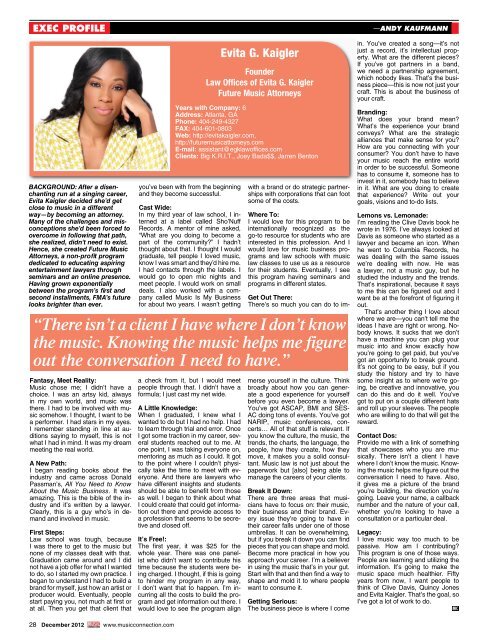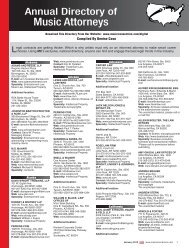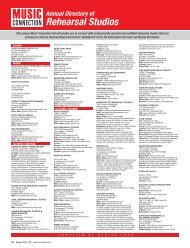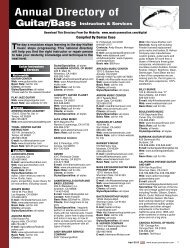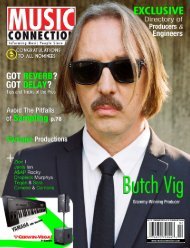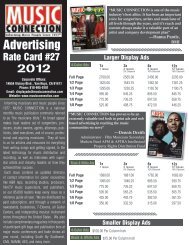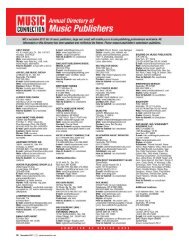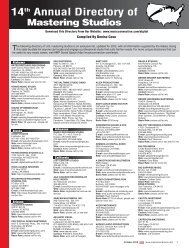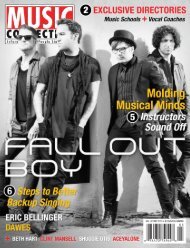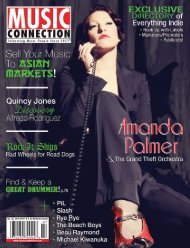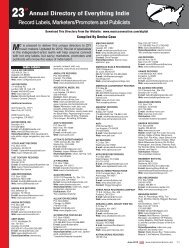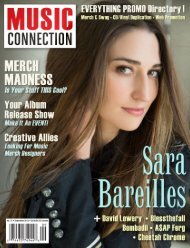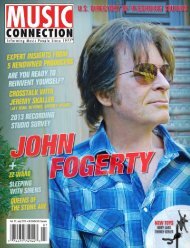TruSource Technology DL2 Integrated Digital Mixer
December 2012 - Music Connection
December 2012 - Music Connection
Create successful ePaper yourself
Turn your PDF publications into a flip-book with our unique Google optimized e-Paper software.
EXEC PROFILE<br />
BACKGROUND: After a disenchanting<br />
run at a singing career,<br />
Evita Kaigler decided she’d get<br />
close to music in a different<br />
way—by becoming an attorney.<br />
Many of the challenges and misconceptions<br />
she’d been forced to<br />
overcome in following that path,<br />
she realized, didn’t need to exist.<br />
Hence, she created Future Music<br />
Attorneys, a non-profit program<br />
dedicated to educating aspiring<br />
entertainment lawyers through<br />
seminars and an online presence.<br />
Having grown exponentially<br />
between the program’s first and<br />
second installments, FMA’s future<br />
looks brighter than ever.<br />
Evita G. Kaigler<br />
Founder<br />
Law Offices of Evita G. Kaigler<br />
Future Music Attorneys<br />
Years with Company: 6<br />
Address: Atlanta, GA<br />
Phone: 404-249-4327<br />
FAX: 404-601-0803<br />
Web: http://evitakaigler.com,<br />
http://futuremusicattorneys.com<br />
E-mail: assistant@egklawoffices.com<br />
Clients: Big K.R.I.T., Joey Bada$$, Jarren Benton<br />
“There isn’t a client I have where I don’t know<br />
the music. Knowing the music helps me figure<br />
out the conversation I need to have.”<br />
Fantasy, Meet Reality:<br />
Music chose me; I didn’t have a<br />
choice. I was an artsy kid, always<br />
in my own world, and music was<br />
there. I had to be involved with music<br />
somehow. I thought, I want to be<br />
a performer. I had stars in my eyes.<br />
I remember standing in line at auditions<br />
saying to myself, this is not<br />
what I had in mind. It was my dream<br />
meeting the real world.<br />
A New Path:<br />
I began reading books about the<br />
industry and came across Donald<br />
Passman’s, All You Need to Know<br />
About the Music Business. It was<br />
amazing. This is the bible of the industry<br />
and it’s written by a lawyer.<br />
Clearly, this is a guy who’s in demand<br />
and involved in music.<br />
First Steps:<br />
Law school was tough, because<br />
I was there to get to the music but<br />
none of my classes dealt with that.<br />
Graduation came around and I did<br />
not have a job offer for what I wanted<br />
to do, so I started my own practice. I<br />
began to understand I had to build a<br />
brand for myself, just how an artist or<br />
producer would. Eventually, people<br />
start paying you, not much at first or<br />
at all. Then you get that client that<br />
you’ve been with from the beginning<br />
and they become successful.<br />
Cast Wide:<br />
In my third year of law school, I interned<br />
at a label called Sho’Nuff<br />
Records. A mentor of mine asked,<br />
“What are you doing to become a<br />
part of the community?” I hadn’t<br />
thought about that. I thought I would<br />
graduate, tell people I loved music,<br />
know I was smart and they’d hire me.<br />
I had contacts through the labels. I<br />
would go to open mic nights and<br />
meet people. I would work on small<br />
deals. I also worked with a company<br />
called Music Is My Business<br />
for about two years. I wasn’t getting<br />
a check from it, but I would meet<br />
people through that. I didn’t have a<br />
formula; I just cast my net wide.<br />
A Little Knowledge:<br />
When I graduated, I knew what I<br />
wanted to do but I had no help. I had<br />
to learn through trial and error. Once<br />
I got some traction in my career, several<br />
students reached out to me. At<br />
one point, I was taking everyone on,<br />
mentoring as much as I could. It got<br />
to the point where I couldn’t physically<br />
take the time to meet with everyone.<br />
And there are lawyers who<br />
have different insights and students<br />
should be able to benefit from those<br />
as well. I began to think about what<br />
I could create that could get information<br />
out there and provide access to<br />
a profession that seems to be secretive<br />
and closed off.<br />
It’s Free!:<br />
The first year, it was $25 for the<br />
whole year. There was one panelist<br />
who didn’t want to contribute his<br />
time because the students were being<br />
charged. I thought, if this is going<br />
to hinder my program in any way,<br />
I don’t want that to happen. I’m incurring<br />
all the costs to build the program<br />
and get information out there. I<br />
would love to see the program align<br />
with a brand or do strategic partnerships<br />
with corporations that can foot<br />
some of the costs.<br />
Where To:<br />
I would love for this program to be<br />
internationally recognized as the<br />
go-to resource for students who are<br />
interested in this profession. And I<br />
would love for music business programs<br />
and law schools with music<br />
law classes to use us as a resource<br />
for their students. Eventually, I see<br />
this program having seminars and<br />
programs in different states.<br />
Get Out There:<br />
There’s so much you can do to immerse<br />
yourself in the culture. Think<br />
broadly about how you can generate<br />
a good experience for yourself<br />
before you even become a lawyer.<br />
You’ve got ASCAP, BMI and SES-<br />
AC doing tons of events. You’ve got<br />
NARIP, music conferences, concerts…<br />
All of that stuff is relevant. If<br />
you know the culture, the music, the<br />
trends, the charts, the language, the<br />
people, how they create, how they<br />
move, it makes you a solid consultant.<br />
Music law is not just about the<br />
paperwork but [also] being able to<br />
manage the careers of your clients.<br />
Break It Down:<br />
There are three areas that musicians<br />
have to focus on: their music,<br />
their business and their brand. Every<br />
issue they’re going to have in<br />
their career falls under one of those<br />
umbrellas. It can be overwhelming,<br />
but if you break it down you can find<br />
pieces that you can shape and mold.<br />
Become more practical in how you<br />
approach your career. I’m a believer<br />
in using the music that’s in your gut.<br />
Start with that and then find a way to<br />
shape and mold it to where people<br />
want to consume it.<br />
Getting Serious:<br />
The business piece is where I come<br />
—ANDY KAUFMANN<br />
in. You’ve created a song—it’s not<br />
just a record, it’s intellectual property.<br />
What are the different pieces?<br />
If you’ve got partners in a band,<br />
we need a partnership agreement,<br />
which nobody likes. That’s the business<br />
piece—this is now not just your<br />
craft. This is about the business of<br />
your craft.<br />
Branding:<br />
What does your brand mean?<br />
What’s the experience your brand<br />
conveys? What are the strategic<br />
alliances that make sense for you?<br />
How are you connecting with your<br />
consumer? You don’t have to have<br />
your music reach the entire world<br />
in order to be successful. Someone<br />
has to consume it, someone has to<br />
invest in it, somebody has to believe<br />
in it. What are you doing to create<br />
that experience? Write out your<br />
goals, visions and to-do lists.<br />
Lemons vs. Lemonade:<br />
I’m reading the Clive Davis book he<br />
wrote in 1976. I’ve always looked at<br />
Davis as someone who started as a<br />
lawyer and became an icon. When<br />
he went to Columbia Records, he<br />
was dealing with the same issues<br />
we’re dealing with now. He was<br />
a lawyer, not a music guy, but he<br />
studied the industry and the trends.<br />
That’s inspirational, because it says<br />
to me this can be figured out and I<br />
want be at the forefront of figuring it<br />
out.<br />
That’s another thing I love about<br />
where we are—you can’t tell me the<br />
ideas I have are right or wrong. Nobody<br />
knows. It sucks that we don’t<br />
have a machine you can plug your<br />
music into and know exactly how<br />
you’re going to get paid, but you’ve<br />
got an opportunity to break ground.<br />
It’s not going to be easy, but if you<br />
study the history and try to have<br />
some insight as to where we’re going,<br />
be creative and innovative, you<br />
can do this and do it well. You’ve<br />
got to put on a couple different hats<br />
and roll up your sleeves. The people<br />
who are willing to do that will get the<br />
reward.<br />
Contact Dos:<br />
Provide me with a link of something<br />
that showcases who you are musically.<br />
There isn’t a client I have<br />
where I don’t know the music. Knowing<br />
the music helps me figure out the<br />
conversation I need to have. Also,<br />
it gives me a picture of the brand<br />
you’re building, the direction you’re<br />
going. Leave your name, a callback<br />
number and the nature of your call,<br />
whether you’re looking to have a<br />
consultation or a particular deal.<br />
Legacy:<br />
I love music way too much to be<br />
passive. How am I contributing?<br />
This program is one of those ways.<br />
People are learning and utilizing the<br />
information. It’s going to make the<br />
music space much healthier. Fifty<br />
years from now, I want people to<br />
think of Clive Davis, Quincy Jones<br />
and Evita Kaigler. That’s the goal, so<br />
I’ve got a lot of work to do.<br />
28 December 2012 www.musicconnection.com


